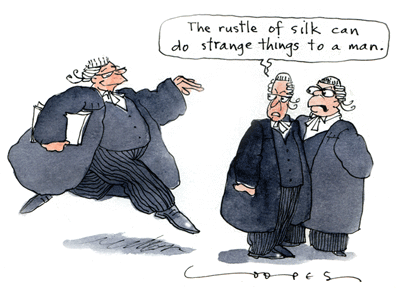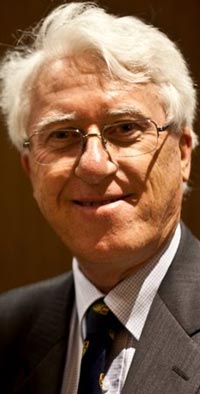Criteria for silk still unfair
 Bar Talk •
Bar Talk •  Tuesday, October 19, 2010
Tuesday, October 19, 2010 NSW silk selection reforms have not gone far enough, says Alexander Street SC ... The process still needs fundamental reform ... Just when the bar council was patting itself on the back for a job well done, along comes a fresh broadside from an insider  Sandy Street, a long serving member of the council of the NSW Bar Association, has called for further substantial reform of the silk selection process - six days after the 2010 crop of 20 new appointments under a revamped protocol were announced.
Sandy Street, a long serving member of the council of the NSW Bar Association, has called for further substantial reform of the silk selection process - six days after the 2010 crop of 20 new appointments under a revamped protocol were announced.
Street told Justinian that at least another 20 to 30 appointments should have been made and that the current revised process is still "materially flawed".
"The process needs to be able to withstand the cathartic glare of fundamental principles or procedural fairness and fair market competition."
Despite the introduction this year of a requirement for applicants to submit details of their previous 18-months work, the old system of ticks and crosses from over 600 "consultees" seemed to carry more weight. Street says:
"There is still an irrelevant criterion of statistical survey that is taken into account as if an evaluative process by numerical popularity. That criterion remains one that is more appropriate to a beauty pageant, not the evaluation of work and leadership skills at the bar.
Popularity among colleagues or the bench is irrelevant and the critical criterion should be only work-based by reference to whether regularly appearing in the highest courts or regularly appearing against silk or regularly being engaged as a leader in a field of legal discipline and expertise."
 Sandy Street: many more should be allowed to compete as senior counselStreet specifically identified, without naming them, two unsuccessful candidates for silk: a leading female barrister in the field of mediation and a very experienced criminal barrister with a regular practice of High Court appellate work.
Sandy Street: many more should be allowed to compete as senior counselStreet specifically identified, without naming them, two unsuccessful candidates for silk: a leading female barrister in the field of mediation and a very experienced criminal barrister with a regular practice of High Court appellate work.
He said that there needs to be a "very substantial" increase in the number of female barristers appointed as senior counsel. Redressing the imbalance of female representation on the courts has meant that there are too few senior women barristers who remain at the bar for very long.
There are also a large number of able male barristers who have been excluded time and again from competing at the inner bar.
The retirement of silks each years would justify "at least another 20-30 appointees from the list of applicants".
There are those who decline to reapply on principle after having been knocked back years ago.
"There are other very able barristers, who have appeared regularly in the highest courts in Australia or against silk, including in one instance the International Criminal Court, who did not apply this year having been wrongly deterred by recent deficiencies in the process."
Street says that failure to recognise these barristers as senior counsel disadvantages the public and the public interest.
He is calling for a much fairer selection process.
Most, if not all, unsuccessful applicants should be given reasons along with a real right of review.
The new protocol, based on the recommendations of the Gyles report, simply did not go far enough.
* * *
 Keith Mason: reported plenty of "ear-bashing"According to retired appeal judge Keith Mason, who officially observed the process, members of the selection committee spent a good deal of time being "ear-bashed" by sponsors, well-wishers and not-so-well wishers of particular candidates.
Keith Mason: reported plenty of "ear-bashing"According to retired appeal judge Keith Mason, who officially observed the process, members of the selection committee spent a good deal of time being "ear-bashed" by sponsors, well-wishers and not-so-well wishers of particular candidates.
In other words, the system is accompanied by lobbying, log-rolling and special pleading from unseen voices.
Consultees also are approached for more information and on occasions they indulge in a bit of boosterism or quietly slip in the knife.
As Mason put it in his report:
"Some consultees when contacted, qualified or modified their written response in significant ways. For example, when approached for further and better particulars, some indicated that their PE [professional experience] NOT YET meant 'definitely not, but I was being polite'."
The point is that applicants are not aware of these whispered assessments and reassessments and are not given an opportunity to respond.
Mason thought that greater emphasis should be placed on each candidate's record of work and to this end he recommended that more than 18 months be disclosed.
Others are urging that the entirety of a practitioner's career should be taken into account.
In any event, Mason was confident that the process did not involve "a mere adding up of responses for and against". He did say that more notice was taken of the opinions of judges who had been consulted, than those of other barristers or solicitors.
However, the protocol is designed to favour members of the bar who can demonstrate skill "on their feet". This meant those who had a record as successful cross-examinors were more likely to be successful than applicants who had large advice practices, or specialised in mediation or taxation.
The selection committee was divided on how to handle applications from mediator barristers. It was decided that such a person is a "practising advocate", but the majority of selectors felt that the essential "skill" component meant that mediators had to demonstrate they had ability to a high degree in the "presentation and testing of litigants' cases".
The bar council was invited to clarify if this interpretation of the protocol is correct.
One barrister with a very large mediation practice points out that:
- Bar rule 74 includes mediation and other ADR as barristers' work.
- The percentage of matters that reach the stage of a final determination is diminishing (e.g. in the Supreme Court of WA it is three percent of matters filed). Many barristers are now involved predominately in the preparation of cases and appearing in court-ordered ADR rather than in traditional contested hearings.
- The current interpretation favours those who "dabble" in mediation, but not those who lead the field.
- The skills required of a mediator appear to be misunderstood. In court-ordered mediations there is a large component of risk analysis, including testing of each party's case and evidence as it at trial in private sessions.
- A diminishing number of barristers will comply with the selection committee's interpretation of the protocol. In other words, the policy adopted flies directly in the face of what is happening in reality.
See full text of Mason's remarks: A view from the inside
 Senior Counsel selection
Senior Counsel selection 








Reader Comments